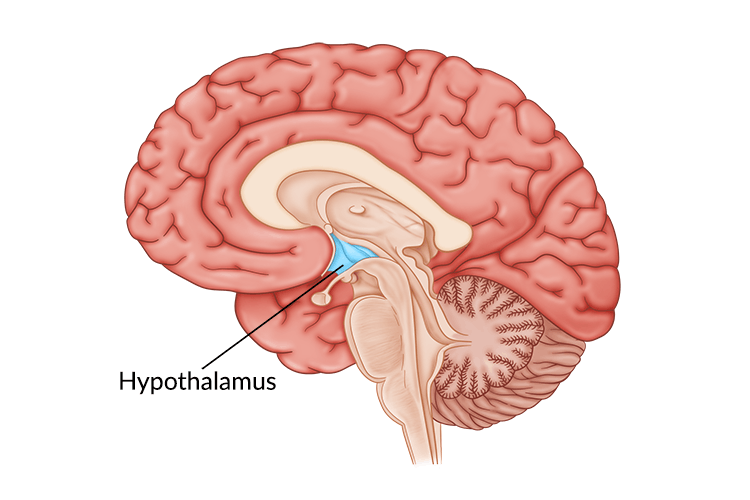The Hypothalamus

What Is the Function of the Hypothalamus?
When the sympathetic nerve is cut during ETS Surgery, this often impairs communication between your hypothalamus and other parts of your body. The hypothalamus is a structure located in the center of the brain that serves as the primary link between the central nervous system and the endocrine system. The endocrine system is responsible for releasing different hormones (chemical messengers) into the bloodstream to help the body function properly. It is involved with different processes of the body including communicating with the autonomic nervous system (which controls automatic life-sustaining functions), developing the reproductive system, and regulating metabolism.
Additionally, the hypothalamus is responsible for maintaining homeostasis, or a balanced state of physiological processes. The body must maintain steady levels of certain vital functions in order to achieve homeostasis. Functions controlled and regulated by the hypothalamus include:
- Body temperature
- Blood pressure
- Respiration
- Digestive secretions
- Appetite
- Hydration
- Weight
- Breast milk production
- Salt and water balance
- Circadian rhythm (sleep-wake cycle)
- Growth
- Childbirth
- Sex drive
- Emotions and behavior
- Memory
The body sends signals to the hypothalamus alerting it when there is an imbalance in any one of these functions. The hypothalamus responds by releasing hormones to balance the body. Each hormone has a specific role but they all work together to achieve homeostasis.
While the hypothalamus drives the production and release of hormones, it most often does so by secreting “releasing hormones”. These travel directly below the hypothalamus to the pituitary gland which then releases the hormones that travel throughout the body.
Damage to the hypothalamus can interfere with many biological processes, including homeostasis. Without the proper exchange of hormones, many organs cannot function properly.
When the sympathetic nerve is cut as part of ETS surgery, communication to the Hypothalamus is impaired causing a range of side-effects which include:
- Fatigue and/or insomnia
- Muscle weakness
- Headache
- Frequent thirst and/or dehydration
- Unexplained weight loss or gain
- Changes in appetite or poor appetite
- High or low blood pressure
- Frequent urination
- Loss of vision
- Infertility
Symptoms of hypothalamus damage often evolve over time and is why the number of ETS related medical issues progressively increases over time.